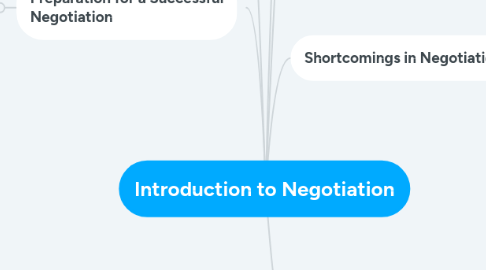
1. Preparation
1.1. Soft Bargaining
1.1.1. Unconditionally surrender
1.2. Hard Bargaining
1.2.1. Prepare for attack
1.3. Compromising
1.3.1. Not always win-win situation
2. Preparation for a Successful Negotiation
2.1. Self-Assessment
2.1.1. 1. Asking yourself what is your target goal
2.1.1.1. Define the ideal outcome, called target point or aspiration point.
2.1.1.1.1. Over-aspiring negotiator
2.1.1.1.2. Under-aspiring negotiator
2.1.1.1.3. "Grass is greener" negotiation
2.1.2. 2. Brainstorm alternatives in case initial plan fails to come into a successful closure
2.1.2.1. BATNA
2.1.2.1.1. The points where you are prepared to walk away
2.1.2.1.2. Willing to accept terms superior to it and reject outcomes that are worse
2.1.2.1.3. Dynamic, market forces improve or deteriorate it
2.1.2.1.4. Not influenced or manipulated easily if well defined
2.1.3. 3. Find out your Reservation Point
2.1.3.1. Reservation Point
2.1.3.1.1. Quantification of BATNA with respect to other alternatives
2.1.3.1.2. Develop Reservation Point
2.1.4. 4. Be aware of focal points
2.1.4.1. Key numbers, figures or values that appear to be valid but have no basis
2.1.5. 5. Beware of sunk costs
2.1.5.1. Sunk costs are money invested which can no longer be recovered
2.1.5.2. Influences counter party's and own behavior
2.1.5.3. Consider future costs and benefits instead
2.1.6. 6. Clearly differentiates reservation point and target point
2.1.7. 7. Identify the issues in negotiation
2.1.7.1. mistake of identifying only a single issue
2.1.8. 8. Identify the alternatives for each issue
2.1.9. 9. Identify equivalent packages of offers
2.1.9.1. Discouraged from stating a range
2.1.9.2. expand options by identifying packages of equivalent value
2.1.10. 10. Assess your risk propensity
2.1.10.1. Risk aversion
2.1.10.1.1. Preference of sure thing over uncertainty
2.1.10.2. Risk seeking
2.1.10.2.1. Preference of uncertain thing over sure one
2.1.10.3. Reference Point
2.1.10.3.1. Defines what a person considers as a gain or loss
2.1.11. 11. Endowment effects
2.1.11.1. Happens when the seller feels as the owner of the object
2.1.11.2. Value should not be influenced by irrelevant factors like who owns the object
2.1.11.3. Different reference points lead to different valuations
2.1.12. 12. Ask yourself whether you will regret the decision
2.1.13. 13. Violations of the sure thing principle
2.1.13.1. Reluctance to make a decision and even wasting money to delay decisions
2.1.14. 14. Do I have an appropriate level of confidence
2.1.14.1. Overconfidence effect may drive the counter part away
2.1.14.2. Important to examine why we might feel highly confident
2.1.14.3. Optimistically biased negotiators have a distinct bargaining advantage
3. Importance of Negotiation
3.1. Dynamic nature of business
3.1.1. Create possibilities, integrate interests and accept that there is competition
3.1.2. Enable mobility and flexibility in job maintenance and decentralize decision making
3.2. Interdependence
3.2.1. Integrate and work across business units and functional areas
3.3. Economic Forces
3.3.1. Knowing how to operate in uncertain environments
3.4. Information Technology
3.4.1. Able to communicate with people anywhere, at a moment's notice
3.5. Globalization
3.5.1. Effectively work with different people across functions, industries and cultures
4. Shortcomings in Negotiation
4.1. Leaving money on the table (Lose-lose)
4.1.1. Failing to recognize and exploit win-win potential
4.2. Settling for too little (Winner's curse)
4.2.1. Making too large concessions at first, resulting in a too-small share of the bargaining pie
4.3. Walking away from the table
4.3.1. Rejecting terms offered by the counter party that are better than any other option available
4.4. Settling for terms worse than your alternatives (The agreement bias)
4.4.1. Obligated to agree with counter party despite knowing that the settlement terms are worse than the alternative you came out with if negotiation fails.
5. Traits of Ineffective Negotiators
5.1. Egocentrism
5.1.1. Assuming that the other party will have the same priorities as you, rather than understanding what they really want.
5.2. Confirmation Bias
5.2.1. Firmly believing that what you think is right, in a way being stubborn which hinders learning.
5.3. Satisficing
5.3.1. Settling for something less than what they could have
5.3.2. Not setting high aspirations to optimize strategies
5.4. Self-Reinforcing Incompetence
5.4.1. Reluctance to change their behavior or experiment with new courses of actions for fear of risks
5.4.2. Results in inability to learn and improve skills
6. Negotiation Myths
6.1. Negotiations are fixed-sum
6.1.1. Negotiations are variable-sums
6.1.2. Parties that work together may create joint value than if purely combative
6.1.3. Cannot be purely trusting as value created must be ultimately claimed by someone at the table
6.2. You need to be tough or soft
6.2.1. Effective negotiators must work effectively with the other party as well as leverage their own power and strengths
6.3. Good negotiators are born
6.3.1. Most excellent negotiators are self-made
6.4. Life experience is a great teacher
6.4.1. Experience increases confidence but not accuracy
6.4.2. Overconfidence may lead to unwise risks
6.5. Good negotiators take risks
6.5.1. Tough negotiators are rarely effective
6.6. Good negotiators rely on intuition
6.6.1. Effective negotiation involves deliberate thought and preparation
6.6.2. Proactive rather than reactive
